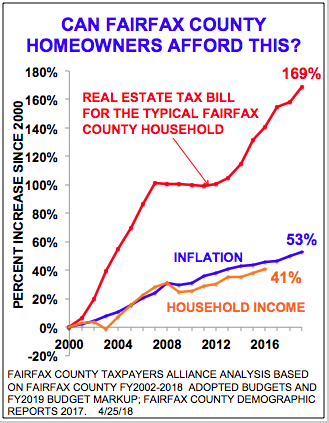Testimony at the Fairfax County Board of Supervisors FY2019 Budget Hearing - 04/11/2018
-- Arthur Purves, April 11, 2018
Madam Chairman and Members of the Board:
|
|
My name is Arthur Purves. I address you as president of the Fairfax County Taxpayers Alliance.
For nearly 20 years this board has been raising real estate taxes two or three times faster than household income. Coincidentally, according to IRS data reported by HowMoneyWalks.com, Fairfax County has seen a net out-migration of $10 billion in wealth. The County Executive's budget presentation states that professional jobs are still below the 2012 level and jobs being added are in education, health services, financial activities, and hospitality. Many of these jobs are low-salary.
The major driver for real estate tax increases is 4% raises for almost all employees -- without regard to performance -- and generous healthcare plans and pensions. The schools justify raises by saying they need to keep up with neighboring jurisdictions. However the neighboring jurisdictions seem to match our increases. Is there collusion where jurisdictions justify raises by comparing themselves with each other? The budget provides little data on applicants per job opening nor a discussion of recruitment issues to justify raises. I find no mention of the teacher flight that was supposed to occur if the meals tax were defeated. Other issues besides salary can affect recruitment, such as classroom discipline, flawed curricula, administrivia, excess testing, and class size, which was increased to pay for raises. Public safety recruiting is significantly hampered by applicants' inability to pass background investigations, which calls into question the schools' success in achieving its stated mission of teaching students to live ethical lives. Is the real justification for 4% raises and pensions at age 55 to win union support at elections?
The high cost of raises and generous benefits, besides jeopardizing the tax base, has also resulted in neglect of infrastructure, notably Metrorail. Metro brings about a $3 billion increase in tax revenues to local governments, and a portion of that should have been reinvested in capital maintenance. It wasn't. Where did the $3 billion go? Was Metrorail milked to fund raises and pensions? Now that bill has fallen due, the county is funding $56 million of its Metro capital commitment by having WMATA sell bonds on the county's behalf. Is this legal? As for Metro's operating budget, isn't it reasonable to increase fares at the same rate that Metro employee compensation is increased? Maybe this would force Metro to divulge its salary scales, raise history, and the details of health and pension benefits, which the Taxpayers Alliance has requested for years but never received.
There is another driver of tax increases, namely the cost of keeping poor people poor. The Mason District school board representative stated at a 2015 League of Women Voters forum that the school board does not know how to close the minority student achievement gap. If school boards cannot educate their students, why are they given veto authority over charter schools? Increased taxes for Medicaid expansion, which the supervisors support in their legislative program, keeps people poor by killing jobs, and it won't improve health. According to Dr. Stephen Shortell of the Berkley School of Public Health, "Fifty percent of the determinants of health are due to our behaviors; ... and only 10 percent to having access to medical care." If the goal were really to help the poor, we would give them schools run by people who believe in them, cut taxes so they could get jobs, and emphasize nutrition and exercise instead of emphasizing more government.
To avoid demagoguery, the founding fathers created a republic instead of a democracy. The defining characteristic of a republic is an unelected senate that does not rely on demagoguery to obtain office. To this end, senators were originally chosen by state legislatures. But in 1913 the 17th amendment changed us from a republic to a democracy by having senators popularly elected. We find democracy in states, where state senators are also popularly elected, and at the local level with the popular election of supervisors and town councils. John Adams stated, "There never was a democracy yet that did not commit suicide." In the twenty years I've attended these hearings, I've been watching democracy commit suicide.
However, there is still time to change.
Thank you.

